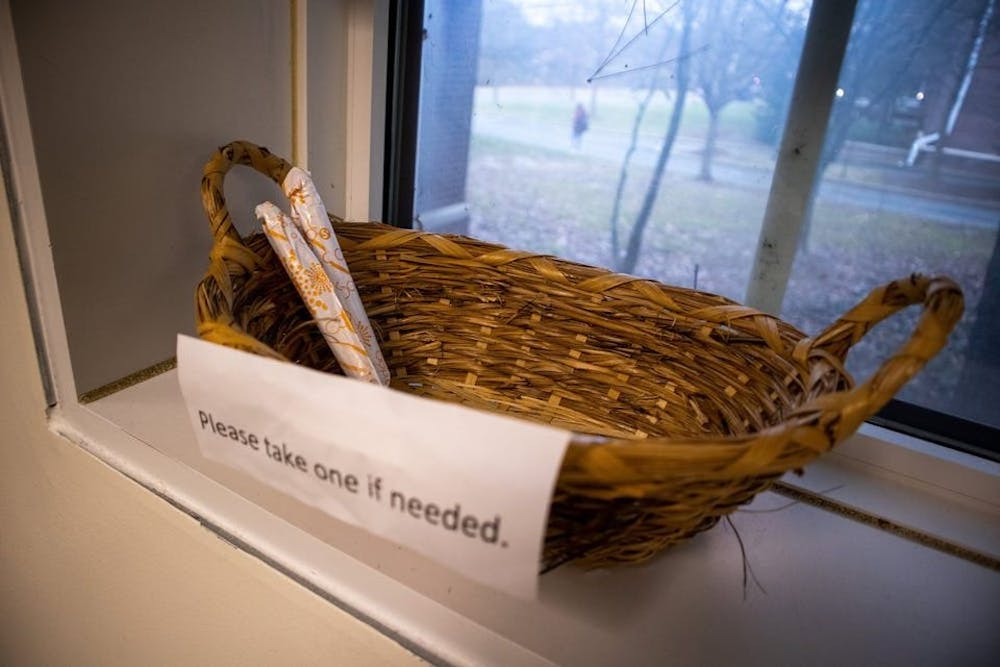By Janjabill Tahsin
Staff Writer
The College administration sent a letter to the campus community in December responding to the Student Government resolution requesting a pilot program to place menstrual products in bathrooms across campus.
The letter announced that the administration was unwilling to proceed with the proposal due to budget cuts stemming from an overestimation in the College’s revenue for tuition, fees and housing, and an underestimation in the state’s reimbursement for employee fringe benefits. Although there are already locations on campus that distribute free menstrual products, the decision sends a clear message: menstrual health, particularly the needs of menstruating students, is a low priority for the administration.
Purchasing menstrual products is one of many financial burdens college students face, along with meeting other essential needs like paying bills and buying food. This is further highlighted by a 2023 survey of college or university students in the U.S. conducted by Intimina, which found that “nearly one in five menstruating college or university students in the U.S. has faced period poverty.”
Period poverty, which refers to the lack of access to or affordability of menstrual products, creates an additional challenge for menstruating people. This burden goes beyond pads and tampons, including pain medication and period underwear. The National Organization of Women estimates that “the average woman spends about $20 on feminine hygiene products per cycle, adding up to about $18,000 over her lifetime.”
At the College, where 57.2% of undergraduate students and 81.1% of graduate students are female, according to College Factual, period poverty can be a significant issue for a large portion of the student body. Considering the already substantial cost of attending TCNJ, ranging from $39,562 to $46,488 per year in 2024-2025, the added pressure to afford menstrual products — a necessity people who menstruate face but others do not — can force students to make difficult choices about their essential needs.
Despite the College administration’s unwillingness to proceed with the Student Government proposal for free menstrual products in bathrooms, accessing existing resources is equally frustrating. While Student Health Services offers free menstrual products, their email subject lines prioritize STI and HIV testing, neglecting to effectively communicate this vital service to students. The other locations on campus do not even send out emails about their resources (or lack thereof).
While I appreciate the accessibility students have to resources like condoms and pregnancy tests, it raises a question of fairness. Since New Jersey mandates sex education, most students likely understand the risks of unprotected sex, except for “a little over 6%” of out-of-state students whose curriculums could vary. Menstruation, unlike sex, is a biological necessity, yet there is a lack of clear communication and easy access to menstrual products on campus.
This prioritization not only creates an unfair burden but can also lead to significant physical health risks. When students are forced to use items like rags, paper towels, toilet paper or cardboard due to a lack of menstrual products, they are at an increased risk of developing reproductive and urinary tract infections, as reported by the University of Washington.
The sole source on campus where students can buy menstrual products is the C-Store. They sell a pack of six mini pads for light flow intensities and tampons. However, the Shop in Campus Town provides tampons and a pack of 16 pads for free once a week for medium intensities.
This does not accommodate all flow types, especially when a student does not have the time or capability to walk from any location to one of these places. If someone is already missing class due to a menstrual emergency, why would they want to go all the way across campus to Campus Town for pads that do not accommodate their flow intensity?
In 2023, Gov. Phil Murphy signed S-1221, mandating that all New Jersey public schools serving grades 6-12 provide free menstrual products. California, however, passed the Menstrual Equity for All Act, which includes California State Universities and community colleges, “to have products available to students in at least one central location on campus and post a sign in all women’s and gender-neutral restrooms and at least one men’s restroom, explaining where products can be found on campus,” according to Mustang News.
Whether or not the College decides to reconsider the Student Government proposal, I propose there should be free dispensers in all first-floor women’s and gender-neutral bathrooms on campus for students’ convenience. Until this is implemented, however, emails should be sent every semester updating students on where menstrual products are located on campus. Furthermore, there should be signs in all women’s and gender-neutral restrooms listing all locations that currently have menstrual products.
If the College initiates change, then it will pave the way for menstrual equity across the state. This will allow state colleges and universities to pursue a similar course of action, ultimately leading to state actions to increase access to menstrual products.







